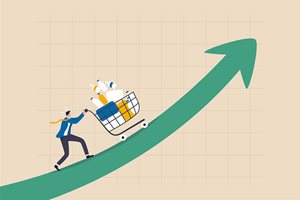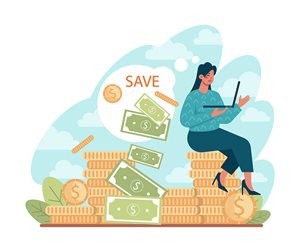Times having been feeling uncertain lately with inflation continuing to rise, and it can have a serious affect on your finances. When prices start to increase, your money won’t go as far as it used to. It becomes more expensive to do just about everything, including putting food on the table, filling up your gas tank, or even going out with your friends. We’re here to support you during these challenging times and provide insight into the financial world.
What is inflation?
Inflation is really a measure of how the prices of goods and services in the economy are changing, with the rate of inflation measuring how quickly prices are rising. Some inflation is necessary for economic growth, but too much inflation can also make common goods and services more expensive. Over the last 40 years inflation has averaged around 3.8% per year.
 According to James Appleby, Managing Director of Wealth Management at Tees, “A healthy economy generally requires inflation to be low and stable. While a small amount of inflation is considered helpful, high and unstable rates can cause extreme economic difficulties. It can erode the purchasing power of household finances and makes it difficult for people to plan how much they can spend, save, or invest.”
According to James Appleby, Managing Director of Wealth Management at Tees, “A healthy economy generally requires inflation to be low and stable. While a small amount of inflation is considered helpful, high and unstable rates can cause extreme economic difficulties. It can erode the purchasing power of household finances and makes it difficult for people to plan how much they can spend, save, or invest.”
How inflation is measured
Economists measure inflation by tracking the Consumer Price Index (CPI), which lists the price of goods and services that consumers buy most often. Economists measure inflation over set periods of time by tracking the price increases for these items.
How to influence inflation
The country’s central banking system has methods to help control the rate of inflation. The Federal Reserve and elected officials will implement rate adjustments to impact inflation. Recently, they have been raising interest rates to reduce the money supply and offset the effects of inflation. This will make it more expensive to take out a loan and borrow money.
Inflation and your finances
Since inflation impacts your buying power, you may need to change the way you manage your money. Avoid higher-priced items and cut back on non-essential purchases that can eat away at your savings. Typically, savings interest rates rise with inflation, so consider less purchasing and more saving, at least for a while.
 When inflation and the price of goods is higher, that will affect both short-term and long-term savings goals. If you don’t have enough income to have a good savings plan, cutback on expenses where you can, to offset the higher prices that impact your budget. Consider adjusting or postponing your short-term savings goals, like upcoming vacations and holiday gift purchases. While this may not be ideal, it may be necessary to survive inflationary periods with the least amount of negative impact.
When inflation and the price of goods is higher, that will affect both short-term and long-term savings goals. If you don’t have enough income to have a good savings plan, cutback on expenses where you can, to offset the higher prices that impact your budget. Consider adjusting or postponing your short-term savings goals, like upcoming vacations and holiday gift purchases. While this may not be ideal, it may be necessary to survive inflationary periods with the least amount of negative impact.
How to protect your savings
The one strategy you probably don’t want to employ: hiding your money away at home. Cash under the mattress is not advantageous because you get no compensation, it is not insured, and is at risk (think theft and fire). Here are some tips that you should consider:
- Be aware: Your cash flow is bound to change during inflation. Pay close attention to the prices of what you purchase. Changes in inflation may mean you need to adjust quantity or frequency of purchases to stay within budget.
- Pay yourself first: Put your money in a high-yield savings account. A savings account with a competitive interest rate can help protect your money against inflation and is insured and protected. It does require the willpower to set aside that money, letting the interest rate help counteract the loss of purchasing power that inflation brings.
- Open or add to 401(k) and IRAs: If you’re not already saving for retirement, you should consider opening a retirement account and saving your funds in a 401(k) or IRA. Although your retirement investments may not outpace the high inflation in the short term, over the course of a decade or two they typically perform well (if you still have some time to invest).

You might need more help to find your financial footing as you’re considering inflation and its effects on your savings. You might want to see a financial planner to assist you with identifying any issues. During periods of high inflation, the news headlines and stock market swings can feel alarming. But a little bit of knowledge and a few smart strategies will go a long way to helping you weather inflationary spikes.
Shelley Hertel is our onsite LPL representative at the Credit Union of Denver Investment and Retirement Center. Give her a call or email to start a conversation. 303·239·1179 shelley.hertel@lpl.com
In keeping with the Federal Reserve’s interest rate hikes, we have competitively increased our savings interest rates. Check out our various Certificates and IRAs options to better protect your funds from inflation.
We hope you found this article helpful. Keep checking back to our blogs under SmartStuff as we add articles regularly.